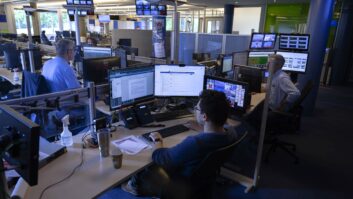The International Confederation of Societies of Authors and Composers (CISAC) has published the results of a wide-ranging survey looking at the potential impacts of gen AI on the media and entertainment (M&E) industry over the next five years. The organisation represents the rights of individual creators and is a strong advocate for the application of copyright laws around the world.

Conducted in collaboration with PMP Strategy, Study on the economic impact of Generative AI in Music and Audiovisual industries, included both quantitative and qualitative analysis based on the insights of industry experts, studies and market data. Some 50 industry professionals were either interviewed or took part in workshops to help determine the market trends and underlying factors that are predicted to shape the evolution of gen AI across M&E over the next five years.
The survey found that the market for gen AI is “skyrocketing,” with growth expected to continue. It estimated that by 2028, the market size for audiovisual content will be €6.48 billion. However, while tech companies will benefit from the increase, there are concerns that creator revenue will be at significant risk. Estimates projected 21 per cent of creators will be adversely affected. Translators and adaptors for dubbing and subtitling face substantial impacts, with as much as 56 per cent of their revenue thought to be at risk. Furthermore, as AI needs to be “fed” by human creativity, screenwriters and directors could see their revenues “cannibalised” by 15 to 20 per cent.
In a press conference to launch the report, the CISAC president, Bjorn Ulvaeus, acknowledged the power of the technology to “enhance human creativity,” and stated he himself was a user of AI tools. “There is no way we can, or should, stand against AI,” he said, adding, “We are not Luddites.”
However, he also highlighted the risk of allowing AI companies to continue unchecked, adding that its growth must not be at the expense of creators’ royalties. Policymakers in numerous jurisdictions are currently working towards legislation to cover AI, which is expanding at an exponential rate. The EU AI Act will regulate artificial intelligence throughout the Union from 2026 and in the UK, the 2024 London AI Summit brought together experts from the field in an effort to expand on the 2023 White Paper, ‘A pro-innovation approach to AI regulation.’

“This is a critical moment, because governments around the world are debating AI,” said Ulvaeus. “We, as creators, must be at the negotiating table. We must raise our voices so creators can be heard at the highest level.”
Using evidence from the survey, which it said is the first global study into the impact of gen AI on the music and audiovisual sectors, CISAC will continue to lobby policymakers to ensure transparency as the technology advances. Facing what it called an existential moment, the organisation is calling for a level playing field upon which tech companies and creators can work together.
Encapsulating the issue, Ulvaueus said, “[We are] very curious about the potential of these tools which are getting better by the week – as long as we can make a deal.






